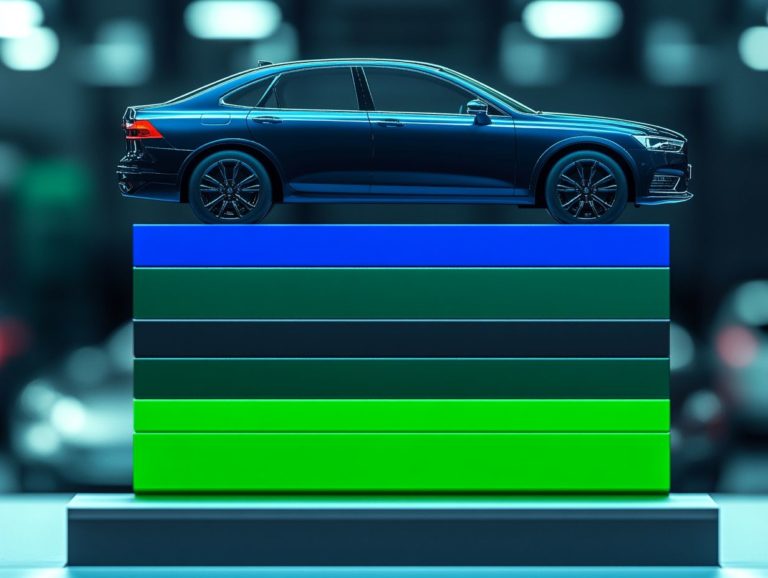How to Compare Features of Hybrid Cars
Hybrid cars are gaining traction as you seek eco-friendly alternatives that don’t compromise on performance. This article delves into what hybrid cars are and how they operate. We’ll cover key factors to help you choose the best model.
From fuel efficiency and environmental impact to cost and maintenance, you’ll find a breakdown of key elements that can influence your choice. We explore different types of hybrids, their standout features, and compare some of the leading models available today.
Explore the exciting world of hybrid cars with us. Make a choice that fits your lifestyle and values.
Contents
Key Takeaways:
- Consider cars that save gas and reduce pollution when comparing hybrid cars.
- Look for key features such as battery type, capacity, and electric motor power.
- Compare popular hybrid car models to find the best fit for your needs.
Understanding Hybrid Cars
Understanding hybrid cars is crucial for consumers aiming to make informed decisions in today’s car market. With options like hybrid vehicles, plug-in hybrids (PHEVs), and fully electric vehicles (EVs), you get a blend of fuel efficiency and sustainability.
These vehicles operate by integrating a gas engine with an electric motor. This integration enhances your fuel economy and significantly reduces maintenance costs compared to traditional vehicles.
Dive into the driving range of hybrids and PHEVs to evaluate their suitability for your daily commutes and longer journeys. It’s wise to consider available tax credits and incentives that come with adopting greener technologies, which can make choosing an environmentally conscious option more appealing.
What is a Hybrid Car and How Does it Work?
A hybrid car combines a traditional gas engine with an electric motor, offering enhanced fuel economy and lower emissions compared to standard vehicles. This innovative design allows for seamless switching between the gas engine and electric motor, optimizing energy use based on driving conditions.
The synergy between these components is crucial for achieving maximum efficiency. For example, during low-speed city driving, the electric motor takes over, conserving fuel, while the gas engine engages when you need extra power—like for acceleration or highway cruising.
Brands like Toyota and Honda exemplify this technology. The Toyota Prius stands out with its exceptional fuel economy, boasting over 50 miles per gallon. Meanwhile, the Honda Insight impresses with its sleek design and minimal environmental impact, making both vehicles attractive to eco-conscious drivers.
By harnessing both power sources’ strengths, these hybrids significantly reduce greenhouse gas emissions, representing a pivotal stride toward a more sustainable future.
Factors to Consider When Comparing Hybrid Cars
When comparing hybrid cars, consider critical factors like:
- Fuel economy
- Cost savings
- Driving range
- Vehicle reliability
Each of these elements significantly influences the long-term value and satisfaction that come with owning a hybrid vehicle. Evaluating your personal needs against these benchmarks will help you make an informed decision.
Fuel Efficiency and Environmental Impact
Fuel efficiency impacts both the cost of ownership and the environmental impact of hybrid cars, making it essential for eco-conscious consumers. These vehicles typically offer impressive miles per gallon (MPG) ratings and low emissions, leading to reduced energy consumption and a smaller carbon footprint.
Fuel efficiency is measured using standardized tests, providing insights into consumption compared to conventional gasoline engines. Lower fuel expenses can accumulate over time, allowing you to allocate those funds toward other necessities or greener initiatives.
Many governments offer tax incentives for purchasing hybrid vehicles, making sustainable transportation more appealing.
Performance and Handling
Performance and handling are essential in hybrid cars, shaping your experience on the road. With the electric motor working with a gas engine, hybrids offer a unique driving experience characterized by smooth acceleration and responsive handling.
This combination enhances your ability to accelerate quickly and contributes to impressive cornering capabilities. The seamless switch between the electric motor and internal combustion engine creates a dynamically responsive driving experience, making hybrids enjoyable in various conditions.
The reliability of hybrid systems minimizes maintenance needs while maximizing fuel efficiency, ensuring consistent performance over time. This harmonious blend of power sources creates a well-rounded driving experience for many drivers.
Cost and Maintenance
The cost of owning hybrid cars includes the purchase price, maintenance costs, and potential fuel savings. Many hybrids require less maintenance than traditional gas-engine cars, leading to significant long-term savings. Hybrids typically feature regenerative braking and have fewer moving parts, resulting in lower repair bills and extended vehicle lifespan. You can also expect reduced fuel expenses due to impressive miles per gallon.
Additionally, potential tax credits and local incentives can further lower your total ownership costs, making energy-efficient vehicles appealing for budget-conscious buyers. Understanding this financial overview is crucial for anyone considering a hybrid for their driving future.
Types of Hybrid Cars
Many hybrid cars are on the market, categorized as parallel hybrids, series hybrids, and plug-in hybrids (PHEVs). Each type is designed for different driving preferences.
Each type presents distinct advantages in terms of performance, fuel efficiency, and charging capabilities. Understanding these options is essential for making an informed choice that aligns with your lifestyle.
Parallel vs. Series Hybrids
Parallel hybrids and series hybrids represent two configurations of hybrid technology, each with unique operational mechanics. In a parallel hybrid, both the electric motor and gas engine contribute to propulsion. A series hybrid relies entirely on the electric motor, with the gas engine only recharging the battery.
This design difference results in unique performance traits tailored to various driving needs. For example, parallel hybrids typically provide superior acceleration and efficiency at higher speeds, making them ideal for highway driving. Conversely, series hybrids like the Ford F-150 Lightning excel in urban settings, maximizing fuel economy with electric-only driving.
Brands like Tesla focus on fully electric powertrains, showcasing how advancements in technology blur the lines between hybrids, leading to greater overall efficiency.
Key Features to Look For
When shopping for a hybrid vehicle, focus on key features that influence performance and satisfaction. Consider:
- Battery size and type
- Electric motor power
- Regenerative brakes
Making informed choices in these areas ensures you select a hybrid that meets your needs and enhances your journey.
Battery Type and Capacity
The type and capacity of the battery significantly influence a hybrid vehicle’s performance and driving range. Most hybrids use lithium-ion batteries, balancing energy storage and longevity. These batteries are ideal for both hybrid and electric applications.
You may also find nickel-metal hydride (NiMH) batteries, which were once standard in earlier hybrid models. Though they generally offer lower energy storage, they excel in durability and temperature resistance.
Your battery choice affects the driving range and battery recharging during braking.
Recent advancements in solid-state battery technology promise higher capacity and faster charging times, appealing to eco-conscious drivers focused on longer distances and shorter charging times.
Regenerative Braking System
Regenerative braking systems enhance energy efficiency by recapturing energy wasted during braking to recharge the battery. This not only improves fuel economy but also extends your driving range.
This technology elevates your driving experience. When you brake, the electric motor switches to generator mode, converting kinetic energy into electrical energy. This process slows your vehicle while replenishing the battery.
Models like the Toyota Prius and Honda Insight showcase advanced regenerative braking systems, which greatly enhance performance and sustainability—making them top choices for eco-conscious drivers.
Electric Motor Power
The power output of the electric motor is crucial for your hybrid’s performance, influencing acceleration and overall driving dynamics. A more powerful electric motor can improve fuel economy by providing additional torque, reducing reliance on the gas engine.
You can see this difference when comparing hybrid models. Some come equipped with larger electric motors, allowing for rapid acceleration and a zippy feel during city driving. Vehicles with lower electric motor power may lack immediate response, impacting your experience.
The interaction between the electric motor and gasoline engine can vary. Some hybrids blend these power sources seamlessly, resulting in a ride that feels smooth and efficient, while others may feel inconsistent.
Ultimately, electric motor output shapes both your fuel efficiency and your overall enjoyment of hybrid driving.
Comparing Popular Hybrid Car Models
When comparing popular hybrid car models, assess their distinctive features, performance specifications, and consumer ratings to find the perfect match for your needs.
Standout options include the Tesla Model 3, Ford Escape Hybrid, and Hyundai Ioniq, each offering unique benefits tailored to various driving preferences.
Top Picks and Their Features
Top contenders in the hybrid and electric vehicle market include the Tesla Model 3, Ford Escape Hybrid, Hyundai Ioniq, and Nissan Leaf. Each vehicle features distinct characteristics catering to your specific needs. From cutting-edge technology to impressive fuel efficiency, these models highlight modern hybrid capabilities.
For those seeking speed and responsibility, the Tesla Model 3 offers stunning acceleration and long-range performance. The Ford Escape Hybrid captivates with its spacious interior and adaptability, making it perfect for families and adventurers.
The Hyundai Ioniq impresses with its exceptional efficiency and affordability, ideal for budget-conscious drivers wanting style and advanced technology.
The Nissan Leaf provides an intuitive interface and dependable performance, making it a great choice for first-time electric vehicle owners in this evolving market.
Frequently Asked Questions
What key features should I compare in hybrid cars?
Compare features like fuel efficiency, battery range, technology, safety, and overall cost of ownership.
How do I compare fuel efficiency in hybrid cars?
Look at the combined city and highway MPG (miles per gallon) ratings. Higher MPG indicates better fuel efficiency.
What is battery range, and why is it important?
Battery range indicates how far a hybrid can travel using electric power alone, which is important for those preferring electric driving for daily trips.
What technology features should I compare?
Consider infotainment systems, driver assistance features, and connectivity options as they enhance your driving experience.
What safety features are important in hybrid cars?
Look for features like adaptive cruise control, lane departure warning, and automatic emergency braking to ensure optimal safety.
How do I compare the overall cost of owning a hybrid car?
Evaluate the initial price, maintenance costs, and potential tax incentives or rebates for hybrid vehicles.

.jpg_00.jpeg)
.jpg_01.jpeg)
.jpg_10.jpeg)
.jpg_11.jpeg)


